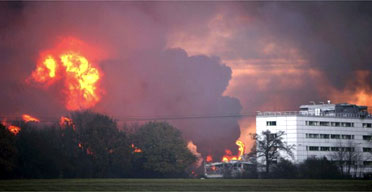Rumbling explosions continued throughout the day as more than 20
of its 26 containers holding 60m gallons of diesel, kerosene and
unleaded petrol buckled and burned in 200ft orange flames. The
blasts were heard by people more than 100 miles away in Norfolk,
Somerset and Sussex and, according to some reports, in France
and the Netherlands. As well as the M1, schools in the area were
expected to be closed today.
Firefighters could only stand back and watch the flames in
the 100-acre distribution centre, the fifth-largest storage
facility in the UK, which borders the motorway and is a hub for
pipelines bringing oil from Humberside and Merseyside, as well
as supplying Heathrow and Luton airports with aviation fuel.
Witnesses, including half a dozen people working at the
terminal, described how they ran for their lives after being
hurled to the ground by the blasts. One person caught 200 yards
from the explosions was in intensive care last night with
serious respiratory problems.
Hertfordshire fire service defended its decision to contain
but not fight the fire for much of yesterday, saying it had been
too hot to get close enough. A spokesman admitted lacking the
necessary stocks of foam to fight the fire, but said it had
assembled 250,000 litres of foam concentrate from fire services
across the country. Last night fire fighters began extinguishing
the blaze under floodlights. They planned to work in three-hour
shifts, pumping 25,000 litres of water each minute from sources
including the Grand Union canal two miles away. The fire could
burn for a week, they said.
"This is possibly the largest incident of its kind in
peacetime Europe," said Hertfordshire's chief fire officer, Roy
Wilsher, who took advice from oil industry experts. "We think we
know what is in there and how to tackle it but like all good
plans, it may change."
Militant Islamists were urged to attack oil installations in
Muslim countries by al-Qaida's deputy leader, Ayman al-Zawahiri,
last week but security sources said there was no indication of
"a national security" connection to the fire. Frank Whiteley,
chief constable of Hertfordshire police, said detectives did not
believe the cause of the explosion was criminal.
When asked about reports that witnesses had seen or smelled
leaks in the days before the explosions, Mr Whiteley said: "It
will be investigated, but it's far too early to say anything
else."
Reports that a bystander last week saw foam being applied to
a fuel leak running across a road near the depot were strongly
denied by Total UK, which jointly owns the site with Texaco. A
spokeswoman said the terminal had an excellent safety record,
but admitted there had been a recent foam spillage on the site.
Fran Jowsey said: "There was a spillage on the site but the
actual spillage was foam concentrate. It was non-flammable and
cleaned up. That was a few weeks ago. We have had no leak on the
site in the last week."
Other companies, including BP and Shell, use the site to
store fuel and Buncefield is also a meeting point for a fuel
pipeline owned by the British Pipeline Agency, which runs from
Merseyside to the south-east.
In 2001, the Health and Safety Executive issued three
compliance notices for safety breaches at Buncefield against the
agency. These were rectified by 2003. The HSE confirmed its
investigators would examine the causes as soon as it was safe.
They said they could not speculate on the possible cause.
The huge black plume raised pollution fears. The Environment
Agency was monitoring the fire to check for pollution to
groundwater and rivers and streams, while health agencies were
monitoring air quality as the elderly and those with breathing
difficulties living in the affected area were advised to stay in
their homes.
The fire also sparked panic buying of fuel and several fights
at petrol stations. The Petrol Retailers' Association said only
panic buying would cause shortages. As the Department for Trade
and Industry and oil companies activated emergency contingency
plans to maintain supplies of petrol and diesel, John Prescott,
the deputy prime minister, visited the scene and said he had
been "impressed" with the work of the emergency services.
